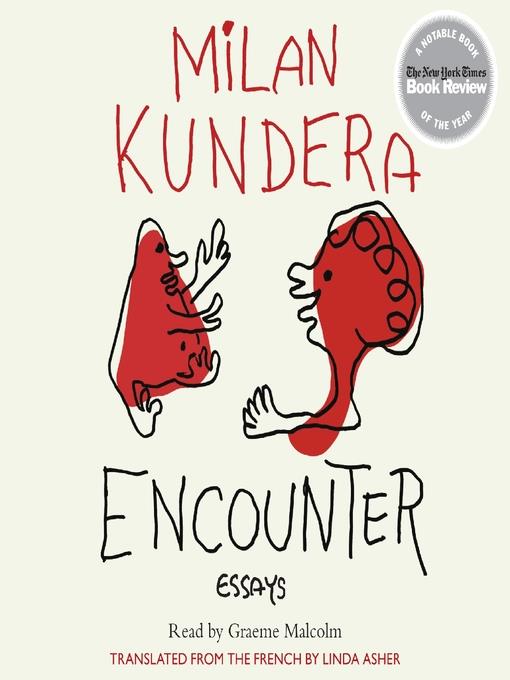
Encounter
Essays
فرمت کتاب
audiobook
تاریخ انتشار
2012
نویسنده
Dean Jensenنویسنده
Dean Jensenنویسنده
Graeme Malcolmناشر
Da Capo Pressناشر
Da Capo Pressناشر
HarperAudioشابک
9780062215635
کتاب های مرتبط
- اطلاعات
- نقد و بررسی
- دیدگاه کاربران
نقد و بررسی

Starred review from July 5, 2010
These mercurial occasional pieces crackle in their soulful brevity. Kundera's (Immortality) unexpected insights into surrealism (especially the poets), the darkly grotesque, the nonconformist temperament will be familiar to readers immersed in this author's fictions. Although a number of the essays date to the early and mid-1990s, there is a refreshing cohesion to this collection. Of specific interest are chapters comparing Francis Bacon to Samuel Beckett; Kundera's devilish mixing up of Roland Barthes with the dour theologian Karl Barth in a chance conversation; several discussions on the virtues of Rabelais as well as a restoration to prominence of Anatole France, who had been given the French intellectualist bum's rush; a powerful coupling of the bright birth of film with the sad death of Fellini; a scholar's relishing of Bertolt Brecht's body odor; the music of his fellow Czech Leos Janácek. Like the proverbial meal at the Chinese restaurant, the delicious musings of this book are filling at first. Two hours later, one craves more.

May 15, 2010
A collection of essays, book, music and art reviews, ruminations and recollections by the celebrated Franco-Czech novelist (Ignorance, 2002, etc.).
Kundera's mind is an expansive forest, and he visits many trees in these pieces, some more than a dozen years old. In some cases he writes about painters, musicians and novelists whose names and works are widely known (Cline, Philip Roth, Beethoven, Breton). Elsewhere, he expatiates about the creations of artists whose identities are known principally by the cognoscenti, companions and countrymen. The latter include the music of Iannis Xenakis, the paintings of Ernest Breleur and the writings of Danilo Kis. Regardless of the subject, Kundera's prose glows, sometimes in sufficient strength to illuminate even the most obscure of his subjects. The pieces all share a compression of style—his few words say much—and even some experimentation. In an essay on painter Francis Bacon, for example, he alternates 1995 observations with what he had written initially in 1977. (He employs a similar strategy later in a piece about Xenakis' music.) Kundera writes with passion about what he views as the foolishness of surrendering a friendship to political differences, and he snarls about the deleterious influence of film and television in a piece about the 100th anniversary of the motion picture, which he labels"the principal agent of stupidity" in the world. The author marvels about the Allied occupation forces after World War II, especially the Americans, who seemed so sublimely confident in their divine election and sanction. Continually, he revisits the hopeful Prague spring of 1968 and its hideous aftermath and agrees with Czech writer Vera Linhartova, who wrote how exile can be transformative for an artist. He chides biographers who are enraptured with the sex lives, and even body odors, of their subjects, and he wonders about the artistic portrayal of the ugly.
Shows that bright shards of clear prose can serve as windows into the unknown.
(COPYRIGHT (2010) KIRKUS REVIEWS/NIELSEN BUSINESS MEDIA, INC. ALL RIGHTS RESERVED.)

September 1, 2010
Originally published as Une rencontre in France, Kunderas home since leaving Czechoslovakia in 1975, this collection of brief essays explores his relationship with art (especially modern art) and mortality (to some extent, his own). Though his subjects include Fellini, Schoenberg, and painter Francis Bacon, much of what Kundera has to say has to do with the novel and the successes and shortcomings of certain novelists; in this way, this selection echoes The Art of the Novel (1986). But his musings on Louis-Ferdinand C'line, Anatole France, and Curzio Malaparte (and others, like Dostoyevsky and Phillip Roth, more familiar to American audiences) occasionally take a wistful turn, and in describing the artists whose work he has loved, his guard seems to come down a bit. A meditation on the French-speaking Caribbean island of Martinique includes a description of the moon that aches with reverence for its beauty but also for its neglect by people who no longer look up at the sky. Perceptive and intimate, this selection will be appreciated by Kunderas many admirers and of interest to fans of European literature in general.(Reprinted with permission of Booklist, copyright 2010, American Library Association.)

























دیدگاه کاربران